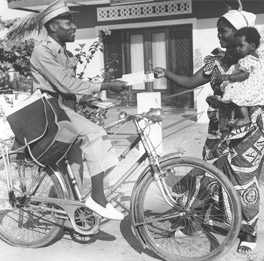A NEW MODERN CULTURE
 Postman in Leopoldville Coll. RMCA Postman in Leopoldville Coll. RMCA |
The colonial administration and Christian churches sometimes find it difficult to establish their authority; some groups resist more than others. However, by 1950, much of the population has integrated Christianity and consumer culture into their daily lives, without Westernizing themselves completely. Obviously, it's in the colonizers' interest to maintain the difference in 'level of civilization' between Belgians and Congolese, which justifies their domination; moreover, they have neither the means nor the desire to control strictly all aspects of Congolese cultural life. These constraints and opportunities favour the development of a culture that is both modern and uniquely Congolese. People develop a taste for foreign products such as 'guaranteed Dutch wax' fabric imported by West Africans and preferred by Congolese women. Whether in the city or in the countryside, some products, including Western clothes and bicycles, become objects of prestige; city-dwellers and villagers love football, lager and the new Congolese urban music. Greek traders and Belgian musicians play an essential role in the development and exportation of this music that spread throughout sub-Saharan Africa. In this new culture, the role of African women diminishes gradually to that of consumers. |


